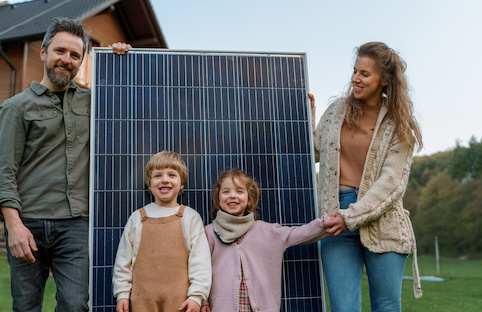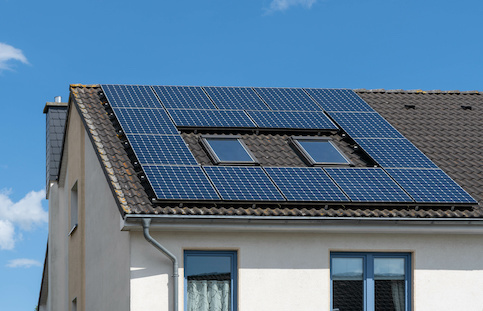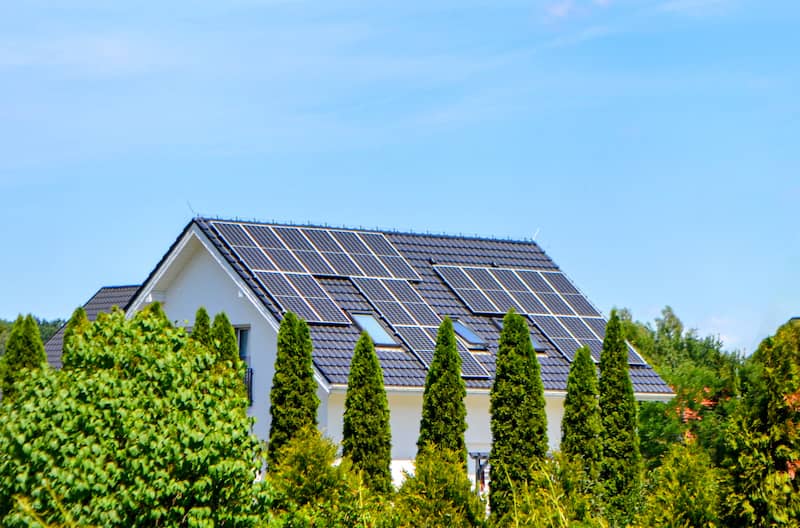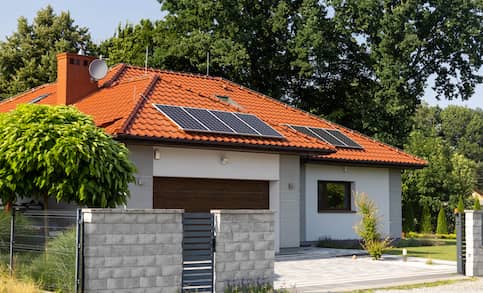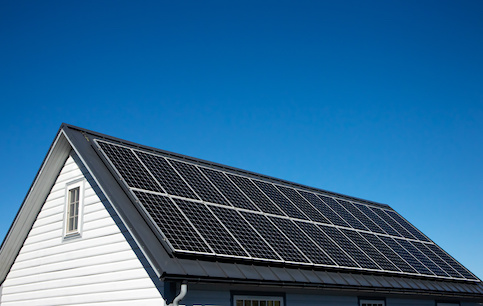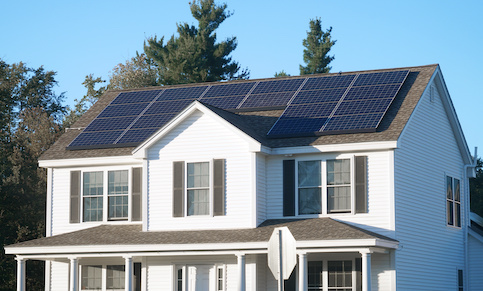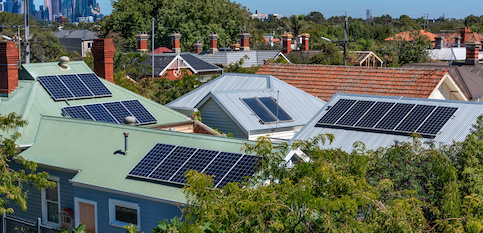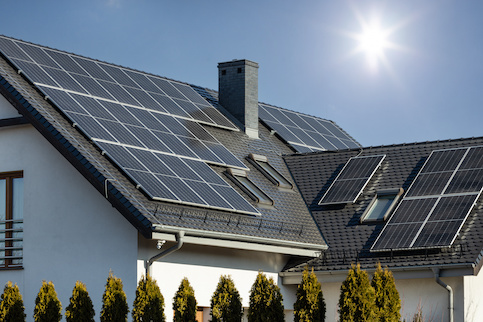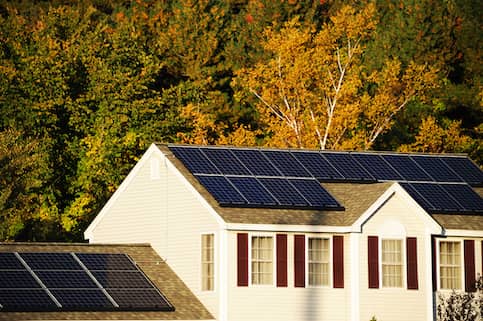Is solar energy renewable? Before we answer that question, what exactly does “renewable” mean?
“Renewable” means that a resource can replenish itself, while “nonrenewable” means that a resource is in limited supply.
When considering installing solar panels or buying a home with solar panels, you may wonder about the renewable and sustainable properties of solar panels.
Is Solar Energy Renewable Or Nonrenewable?
Solar energy, which is harnessed from the sun’s light, is a renewable energy source because it isn’t depleted when used. Instead, the sun naturally regenerates, or renews, its photovoltaic energy at a rate exponentially faster than humans can harvest that energy.
See What You Qualify For
Buy A Home
Discover mortgage options that fit your unique financial needs.

Refinance
Refinance your mortgage to have more money for what matters.
Tap Into Equity
Use your home’s equity and unlock cash to achieve your goals.
Is Solar Energy Renewable Or Nonrenewable?
Solar energy, which is harnessed from the sun’s light, is a renewable energy source because it isn’t depleted when used. Instead, the sun naturally regenerates, or renews, its photovoltaic energy at a rate exponentially faster than humans can harvest that energy.
How Does Renewable Solar Power Work?
Solar energy uses sunlight to provide thermal power and electricity to residential locations. Specifically, solar panels work by allowing photons (light particles) to knock electrons free from atoms, generating electricity.
The energy is harvested with solar panels by converting sunlight into electrical energy through photovoltaic (PV) panels and solar cells. The solar panels may also create electricity to store in batteries or in thermal storage.
Environmental Benefits Of Using Solar Energy
Let’s take a look at the benefits of using solar energy.
- Reduces your carbon footprint: Solar energy reduces carbon emissions and greenhouse gases. Within the first few years of operating a solar energy system (which emits around 50 grams of carbon dioxide per kilowatt-hour), the solar panel’s carbon footprint is about 20 times less than the carbon emitted by coal-powered electricity sources. Consider comparing how many grams of carbon dioxide per kilowatt-hour solar energy produces in its lifetime versus coal power or other energy sources that uses fossil fuels.
- Renews itself: Solar energy’s ability to replenish itself offers distinct environmental advantages. The sun will always continue to produce power and it also doesn’t emit greenhouse gases.
- Doesn’t contaminate the environment: Solar energy doesn’t contaminate water, soil and other environmental landscapes when used.
- Is a native energy source: Native energy means that it’s available just about anywhere on the planet, meaning you don’t need to import the resources (like sunlight) required to operate solar panels.
How Sustainable Is Renewable Solar Energy?
Let’s walk through the environmental concerns of solar power and the sustainability of renewable solar energy as we continue answering the question, “Is solar renewable?”
Environmental Concerns Of Solar Power
The current drawbacks of using solar power include the following:
- Harvesting materials for solar panels: Various materials involved in solar panel production have to be mined, including minerals such as copper, cadmium, gallium, germanium, indium, selenium and tellurium.
- Manufacturing solar panels: Manufacturing solar panels at a power plant, including the production of materials used to harvest solar energy, emits greenhouse gases just like any manufacturing process. However, it’s important to note that carbon emissions are usually offset by the lack of emissions over the life of the solar power system.
- Disposing of batteries: The lifespan of solar panels is usually 25 – 30 years. When their useful lives are over, portions of it might end up in a landfill. Solar energy battery systems last around 5 – 15 years. You’ll almost certainly need a replacement due to the lifespan of solar panels versus battery panels. Unfortunately, solar panels have toxic metals which can leach out into the environment. When disposed of improperly, solar technologies can pose health hazards to the public, particularly if they get into groundwater. The batteries are also classified as hazardous waste and must be disposed of properly.
How Can You Make Solar Panels More Environmentally Friendly?
When you decide to install solar panels, take a few steps to make sure your is as sustainable as possible. Consider taking the following actions:
- Purchase from a reputable manufacturer. Purchase solar panels from a trustworthy company because you want to ensure your solar panels are built to last and have high performance ratings, including your solar company’s reputation with previous customers.
- Choose systems with long lifespans. Some solar panels can last longer than 30 years. However, most panels perform best at around 25 years. Spending more money on quality solar panels and energy systems may allow you to maximize the length of time you have your solar system, reducing the number of solar panels parts that must go into a landfill. Good quality solar panels differ in terms of quality of materials.
- Recycle the materials you can. Research the materials can be recycled locally so you can reduce your impact on the environment. For example, you can pull apart the frame and junction box, glass and silicon wafer, silicon cells and specialty metals and more. You may also want to look into direct use or refurbishment to lessen the impact on the environment.
- Rely solely on solar power. Relying completely on solar panels makes you “off-grid,” meaning that you don’t need to depend on the electrical grid. A completely off-grid approach can reduce your carbon footprint because you rely completely on energy from the sun.
- Sell your surplus electricity. You can sell any extra electricity you’ve stored on your solar panels through a process called net metering through your utility company. You can also access net billing (where you can sell and purchase power from the grid) or through Solar Renewable Energy Certificates (SRECs), which means you get credit for contributing renewable energy back to your state grid.
The Bottom Line: Solar Is Renewable
Now that you can answer the question, “Is solar energy renewable or nonrenewable?” do you want to adopt clean energy the most you possibly can? Electricity generation through solar can have a reduced environmental impact, particularly if you purchase from a reputable manufacturer, choose a system with a long lifespan, recycle the materials you can, go off-grid and sell your surplus electricity back to the utility company.

Melissa Brock
Melissa Brock is a freelance writer and editor who writes about higher education, trading, investing, personal finance, cryptocurrency, mortgages and insurance. Melissa also writes SEO-driven blog copy for independent educational consultants and runs her website, College Money Tips, to help families navigate the college journey. She spent 12 years in the admission office at her alma mater.
